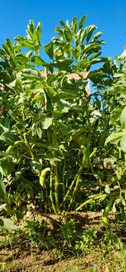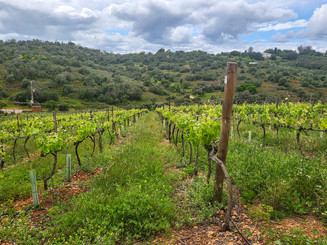Living in Portugal - April 2025
- Tony
- May 3
- 7 min read
So much for an early spring in the Algarve! Some say that we are spoiled, living the dream of numerous days on end filled with sunshine and blue skies, but throw in a few days of rain, and we soon begin talking about climate change and what it's like living in the "Seattle" of Portugal. Well, maybe not so dramatic. The north of Portugal gets significantly more rain than we do in the south, and it truly owns the title "Seattle" when it comes to wet winter days.
We live in the South, expecting perfectly sunny weather year-round, so we can participate in outdoor activities and enjoy the magnificent scenery. However, the few days of rain we endure this time of year make this all possible. Now, bring on the sun!
At home, the gardens appreciate the mix of rain and sun and are in full spring mode. Teresa is harvesting and sharing fava beans, lettuce, potatoes, onions, garlic, and fruit from the Nêspera (Loquat) trees. Carrots, radishes, figs, and oranges will be ready soon. She's busy planting for the next crop of potatoes, tomatoes, French beans, cucumbers, and onions. Early in the month, several citrus trees had so many blossoms on the trees and the ground that it looked like a blanket of snow had fallen. We can't wait for the next crop to be ready.
Mary's flowers are adding additional beauty to our home.
Four large Nêspera (Loquat) trees on the property are full of bright orange fruit. When fully ripe, they are sweet, with a mix of tangy citrus, peach, and apricot flavors. They don't last long, so you eat them from the tree when ripe. I'll often see Teresa and her sister Maria under the tree near the driveway, plucking a few and eating them fresh from the tree. I am trying a few things with some of the fruit (since there is so much of it around), a liqueur made by infusing it into local Aguardente (similar to vodka but made from Madrono fruit). I also found a recipe for Italian Nespolino using the Loquat seeds steeped in the same Aguardente for a few months, resulting in a liqueur that they say tastes similar to Amaretto. We'll see how it comes out.
The peach trees are in beautiful blossom.
The fig trees are also starting to show new leaves, and a few early young figs are growing.

Mary's Chili's seem to be in perpetual production as we find new fruit on them just about every week.
Snails are everywhere in the garden this time of year; keeping them from eating the plants is a constant battle. Luckily, Caracóis (snails) are a favorite seasonal meal for the Portuguese, eaten throughout the Mediterranean. This time of year, we often see locals (including our neighbor Maria in our garden) out gathering them in the wild, carrying bags or buckets full from their harvest. We have yet to sample Caracóis here and are not in a hurry to either.
I have moved our restaurant/dining experiences to the "EAT & DRINK" section of this site. If you are curious about the food we experience, click here.
Feliz Páscoa (Happy Easter)! With Easter falling in April this year, it makes for a month filled with events and celebrations. Portugal, a strong Catholic country, has many festivities and religious activities that happen throughout the country. We celebrated Easter Sunday at home, making Moroccan chicken, au gratin potatoes, asparagus, a lovely salad, and an Italian Sparkling wine from last year's trip to the Piedmont region. Our neighbor Teresa brought us a delicious plate of homemade Portuguese Easter bread.
April 25th is also a day of great celebration in the country, commemorating the Carnation Revolution that brought democracy to Portugal and freedom from dictatorship in 1974. It is a day when the Portuguese celebrate in remembrance of Portugal’s struggle for independence. The Carnation Revolution brought down more than 40 years of dictatorship here and ended Europe’s longest-surviving authoritarian regime. Red carnations marked a peaceful revolution with no shots fired.
The name Carnation Revolution comes from the events of that special day. Celeste Caeiro was supposed to work in a restaurant, but due to the revolution, it didn’t open. The restaurant’s first anniversary was on 25 April, and to celebrate, the owners planned to give out flowers to all its customers, but on that day, it didn’t go to plan because of the coup. Celeste was sent home with the carnations, but when she saw the tanks and soldiers on the streets, she asked them what was happening. They replied: ‘It’s a revolution!’. One of the soldiers asked her for a cigarette, but she had none; she only had the flowers, so she placed them in the muzzles of the soldiers’ guns and became known as Carnation Celeste. The population took to the streets to celebrate the end of the dictatorship, and others followed suit, with carnations placed in the guns and on the soldiers' uniforms. Photos of the guns with the flowers became an iconic symbol of peace.
A sunny morning walk on the boardwalk in Alvor
We organized a Lunch and tasting with friends at Quinta dos Santos, located between Ferragudo and Carvoeiro. The beautiful setting of contemporary buildings that blend into the local landscape and heritage includes a winery, cellar, brewery, taproom, and restaurant—all set amongst almond, carob, oak, and ancient olive trees. We've been here before, but it was a first for a few. Great food and the option to do a wine or beer tasting/flight with your meal.
An afternoon visit with friends to Quinta dos Sentidos, one of our favorites in the area, located near Silves. It's a husband-and-wife project curated with great care from an abandoned property in ruin. The Swiss/Danish couple, Beat and Charlotte, came to Portugal, fell in love with an abandoned Quinta near Silves, and proceeded to turn it into a small family estate. In addition to their home, the site consists of vineyards, olive groves, orchards, gardens, and 1.5 ha of untouched nature brimming with wildlife and insects, including nearly half a million bees. The estate also features an aquatic ecosystem – a bio-lake home to countless plants, frogs, and other creatures, and a bird refuge.
14,000 young vines of traditional varietals and an experimental plot with several varietals unique to the Algarve and Portugal were all planted in rocky soil by hand. Very old olive trees were revived, some transplanted into a thriving orchard or the landscape, their private home and the production facilities were later added, allowing for complete onsite production of wine, olive oil, verjus, and honey. Other than vines and olive trees, they have planted more than 300 other species, including 110 fruit-bearing plants with origins ranging from temperate to tropical climate zones. About 40 of these are different citrus plants. Most fruit is shared with neighbors or provided to top local restaurants. What they produce here is of high quality; the wines and olive oil we have tasted are great and reflect the care and passion they have for the project.
Afternoon walk to the Alvor dam and estuary
We're finally back on the boat, although both trips ended up choppy toward the end. This trip was with friends Larbi and Gloria, their niece, and her friend, who were visiting from the US. We traveled along the coast east from Portimao to the famed Benagil caves.
On the boat again, Mary and I ventured to Lagos for lunch. We saw our first pod of dolphins in the river just outside the Portimao Marina. The boat ride to Lagos was nice, but a southeast wind kicked up on the way back, making it a bumpy, wet ride to Portimao. We had to stop at the Alvor inlet for a break, then slowly made our way head-on into the wind-driven swells.
Afternoon walk on Alvor beach. A little windy, but the ocean and skies were beautiful.
Random photos from our month
We experienced a massive power outage late in the month that affected Portugal, Spain, and Southwest France. We adapted effortlessly with flashlights, batteries, candles, power banks for our devices, etc. We even fired up the BBQ to cook dinner. A few hours into the blackout, though, things started to change. We were reading "news" of a suspected terrorist hacking, and statements that it may take a week to restore the power grid. There was very little communication about what was happening or what to expect. A few hours in, we lost communication altogether, the internet networks and cell towers seemed to fail like dominoes, leaving us blind. The only communication we could find was via radio, but only in Portuguese, so it wasn't easy to understand. We walked down to our village's small market to get a few things, only to discover a line of about twenty people filling the darkened store, while the clerk was tallying their purchases by pencil and paper. We decided to let others get what they needed and make do with what we had at home. There were runs on the stores, and people were fearing the worst, not stocking up on TP as in the US. Instead, tinned fish, bread, wine, and water were the popular options here. Twelve hours later, power was restored around midnight.
The cause is still under investigation. The top culprit is an imbalance of power in the shared grid, triggering high-power circuit breakers. Of course, the blame is still ongoing—Portugal blaming Spain, Spain blaming France, etc. It was another new experience for us in Portugal.
In May, we're heading to northern Portugal for a tour of the Dao wine region. Then, it's off to Greece, where we'll meet Kenia and Marlene for a few days in Athens and a sailing cruise through the Greek Islands.
The rest of the family continues to thrive in Portugal. Barney is perfecting his communication skills, whether reminding us it's time for food by sitting in front of his empty dish and staring at us, or sitting in front of the couch and looking at us to say it's time for lap time and petting, or the "don't bother me, I'm sleeping" pose.

Sonny, on the other hand, is a bit more subtle. He hides in his tower, sits at the dining room table, or finds various places and positions for his frequent naps.
We've had a new addition to the neighborhood who frequently stops by to stare at our kitties through the window or to roll around outside, seeking a head scratch or some attention from us. She looks younger and is very friendly. She has a big voice that announces her presence in the area, which can be heard from a distance.
As always, we hope everyone is doing well, healthy, happy, and thriving. We miss you and love you all...A lot!






















































































































































































Comments